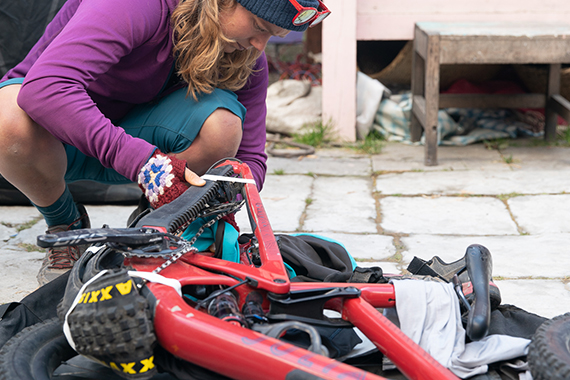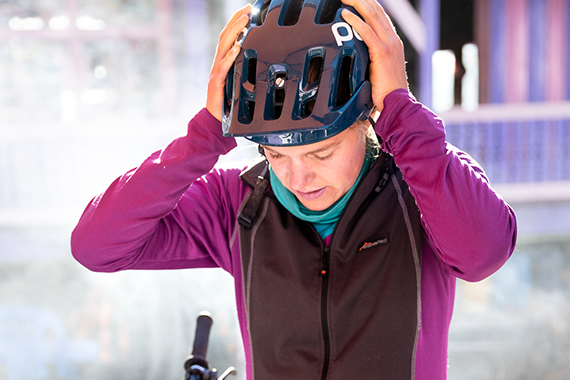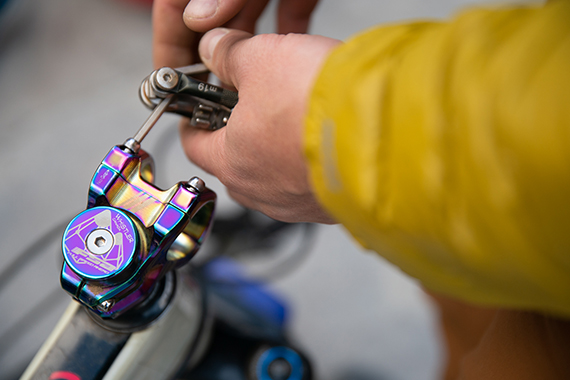race rules

WHAT KIND OF PROTECTION AND BIKE APPAREL DO I NEED?
- Helmets are mandatory to be worn whenever a rider is pedaling their bike. The helmet can either be full-face or half-lid according to the individual’s comfort level. Helmets with a removable chin guard/piece are also acceptable. Knee pads are the other piece of mandatory apparel (for timed stages).Other recommended apparel include:
- Additional body armor (elbow pads, chest protector, back protector, etc) according to the individual’s comfort level
- Padded shorts or bib shorts
- Full-fingered gloves
- Eye protection (sunglasses or goggles see the answer to next question below)
- Two or more sets of comfortable riding shorts + jersey
 As part of their packing list, all participants must bring along:
As part of their packing list, all participants must bring along:
- A minimum 0-degree C-rated insulated sleeping bag
- A Gore-tex or equivalent material hooded, storm-shell/waterproof jacket
- A down/synthetic insulated jacket or insulated fleece/wool mid-layer
- One or more insulated beanie/balaclava/headscarf
- A pair of sunglasses or goggles (with tinted lenses for bright sunlight) Besides, the recommended equipment includes (but are not limited to) the following:
- One or more sets of insulated synthetic or wool base layers (for both top and bottom)
- Warm gloves / Warm socks
- Spare clothing & sturdy walking/running shoes for casual hiking & sightseeing
- Lip balm/Sunscreen/Ear plugs
- Head torch
- Baby wipes and/or anti-bacterial hand sanitize gel

DO I NEED INSURANCE TO TAKE PART IN THE YAK RU ENDURO?
- Yes. The event passes through remote and hard-to-access areas. Helicopter evacuation is maybe necessary for the event of an emergency. All participants must have insurance that will cover this and any medical treatment that may be required.
- All successful entrants to the event must show proof of insurance before the race start. Anyone without adequate insurance will not be allowed to take part.
faqs
Firstly, we warmly welcome you to visit Nepal with the intent to extend your support/presence to your loved ones and friends who are participating in the Yak Ru Enduro.
We recommend you schedule your trip to coincide with the end portion of our event. The riders will be racing from 15,16 and 17 November, and riding an additional one day along the Annapurna Trekking Circuit on 18 November towards the village of Tal; before traveling on 19 November by motor vehicle back to the satellite town of Besishahar (and after that to Kathmandu). To enjoy the best scenery of the region, we recommend you schedule your travels to arrive in the region on-time or earlier (if you need time to sight-see) to intercept our convoy at either at Jagat or Besishahar. If not, linking up in Kathmandu itself (from 11 November 2021 onwards) remains the best option for you to integrate your travel plans with that of the Yak Ru Enduro.
Please write to our parent company Dawn Till Dusk for more information on tourist facilities, services, tour packages, as well as scenic/cultural/active travel itineraries in Nepal.
The Yak Ru Enduro has the majority of its riding route, including all timed stages taking place at elevations above 2000m above sea level. The organization has appointed a doctor trained and experienced in high altitude medicine to head and advise all medical and first responder staff. Likewise, all event safety staff and first responders are trained to recognize the signs and symptoms of Acute Mountain Sickness (AMS) in participants. Regular mandatory blood oxygen-level monitoring for all participants will take place daily led by the aforementioned event doctor – employing an optical oximeter.
Event medical staff will be fully equipped to swiftly deal with any AMS occurrences. In the event of anyone experiencing AMS, a single of combination administration of descending to a lower altitude, drugs, and bottled oxygen therapy will take place at the direction of the event doctor. If necessary, an air evacuation by helicopter to a lower altitude can be effected.
AMS can be prevented through careful acclimatization (chiefly: ascending gradually, avoiding overexertion, having adequate sleep/rest, and staying well-hydrated and fueled). AMS can affect a group of people at varying rates and often bears no correlation to individual fitness level or level of training entering the event. Persons who have suffered AMS before are more prone to a recurrence of AMS.
We ascend gradually – to reduce the chances of anyone experiencing AMS. The itinerary of the Yak Ru Enduro affords this through a gradual approach to the race location, taking one-and-a-half days to reach an altitude of over 3000m – from the capital city of Kathmandu (situated at 1600m altitude). This ascent includes a gentle, non-competitive acclimatization ride scheduled before the first day of racing.
Participants may consider taking drugs to speed up their acclimatization rate to high altitude. A prescription of Acetazolamide (Diamox®) may be obtained from a GP doctor. There is also evidence that dexamethasone a form of steroidal medication can prevent AMS.
Please be aware that the above advice should be considered with a professional consultation from a GP doctor, and that side effects and allergies from drug intake may manifest themselves.
Yak Ru Enduro participants will each be given an 80-liter duffel bag as their official luggage. No other bag may be used due to the strict weight and space constraints in place for the logistics convoy. A day in Kathmandu is set aside to allow you to re-arrange your packing list and sort out your bags.
Any items not needed for the journey can be left for safekeeping in a secure luggage storage at the hotel/guesthouse in Kathmandu and retrieved upon your return.
For the 3 days of enduro racing, you can expect to be out on the trails between 3 and 5 hours per day. Days start early: you will typically be on your bike by 6.30am but will wrap up each day’s riding in good time for lunch.
The mandatory pre-race acclimatization ride takes place in the afternoon and is expected to take around 2.5 hours.
The post-race non-competitive group ride starts later in the morning (exact time to be confirmed) and will include stoppage for tea-breaks and lunch along the way, for a total time of between 5 and 6 hours.
The vehicles used for uplifts are Mahindra 4WD vehicles. They can take up to 5 riders and their bikes comfortably for short distances (or 4 riders, 4 bikes, and their belongings for longer distances). Full details of the sections where vehicular uplifts are available can be found in the detailed itinerary.
In summary: vehicles will be used to shuttle riders and their bikes through uphill sections of a dirt road where necessary. Riders are advised to follow the instructions and be punctual about timings are given during daily briefings to avoid delays in loading and transport.
The event is a blind enduro, and hence having the skills and confidence to ride technical and rugged descents without prior practice is a must.
Being a multi-day event on steep terrain, endurance and stamina play important roles, as does having the physical strength to manhandle/carry your bike over unrideable portions of the route.
Previous experience with big-mountain alpine-style riding is beneficial, as is experience with touring or expeditions in remote regions or at high altitudes. If you do regular cross-training by trail running, hiking, climbing, or mountaineering, you will also be at an advantage.
If you do not have sufficient experience, we do not recommend that you take part in this event.
If you are unsure, do submit your application form first. We will contact you after assessing your suitability on the merit of your submission and advise you accordingly.
The entry fee covers all land transportation within Kathmandu: between airport & accommodation; and between accommodation & briefing/dining venues. It also includes airlift to Manang and land transport from the event venue (Manang District) and Kathmandu, a 1-day journey by 4WD/truck transport. Finally, it also covers shuttle/uplift transport (on race days) and support-vehicle transport (On non-race days) during the event days. You are covered for all in-country transports.
Nine (09) nights’ accommodation (from 11 to 20 November 2021) is included. Yak Ru is not a camping / tent-city MTB event. We provide comfortable, safe, insulated, well-furnished single-gender assigned accommodation for all participants and staff for the entire duration of the event.
In Kathmandu, comfortable and modern-furnished hotel with twin-share rooms (with complimentary BF, Wi-Fi, attached toilets & showers, running cold/hot water, proximity to shops & restaurants, wall electrical sockets, etc.) will be a standard feature on the nights of 11,12,13 November and 19 November 2021.
In the Manang District, twin-share rooms in village hotels and tea houses will be a standard feature during the race days. These smaller, more cosy rooms will have warm bedding (essential in the alpine regions you may request for additional blankets), attached or shared toilets & shower facilities (with running cold/hot water), wall electrical sockets, and in-house dining.
Full details of accommodation location each night is listed in the detailed Yak Ru 2021 itinerary. Please inform us in advance if you prefer to have a private room to yourself, or are attending the race as a couple / with friends.
Nepali cuisine suits a wide range of palates, whether in the capital city of Kathmandu or the mountain towns and villages. For the Yak Ru Enduro, catering at official mealtimes consists of buffet-style meals where a combo of simple yet tasty and nutritious food options are available to choose from:
For breakfasts: porridge/cereal, bread (including Tibetan bread, pastries, or sliced loaves), eggs, and condiments; plus coffee, tea, juice, and bottled water.
For lunches: Dal-Bhat (both vegetarian as well as meat options), rice/noodle dishes, soup/stew/finger food options; plus coffee, tea, juice, and bottled water.
For dinners: Dal-Bhat (both vegetarian as well as meat options), rice dishes, soup/stew; plus coffee, tea, juice, and bottled water.
Additional food and drinks, including alcoholic beverages, may be purchased at one’s own expense outside of mealtimes as well as during mealtimes.
While any mountain bike including hardtails may adequately complete the route for the Yak Ru Enduro, it is recommended to equip oneself with a bike that is:
– Able to take the punishment of very rough, exposed, and long descents
– Agile and maneuverable for technical and steep trail sections
– Light enough to pedal and carry/push uphill for extended periods.
A sure bet would be to take a full-suspension all-mountain or aggressive trail bike equipped with:
– Suspension travel between 120mm and 180mm
– A dropper Seatpost
– Powerful disc brakes
– A burly wheelset, including tubeless tires with tough sidewalls & aggressive treads
– A wide-range drivetrain, including a clutch derailleur and/or chain retention device.
Clip-in pedals are suitable and offer proper attachment when going fast or pedaling on technical terrain. But do keep in mind that due to the decent amount of walking & bike-carrying you will encounter during the race days, there are a strong case for choosing comfortable, high-grip, rubber-soled trail™ or enduro style mountain bike shoes rather than stiff, narrow cross-country style ones with carbon or hard plastic soles. While some clip-in shoes offer excellent grip and walking comfort, you may opt for full platform/flat pedals and shoes with no cleats.
The final decision rests on how you regard the inevitable task of uphill walking pushing/carrying your bike – in alpine conditions that include steep inclines, loose scree, and possibly wet rocks with mud/water/snow. There will also be technical descents where you may have to put your foot down (unclip) while riding your bike.
The event takes place far from any bike shops or bike servicing facilities, and so self-reliance on an individual basis as well as within the event body will be paramount.
We are engaging the services of bike mechanics from Kathmandu who are well versed in servicing and maintaining high-end mountain bikes and their components. These mechanics will serve as neutral technical support for the entire race. Apart from workstands and a wide range of tools, they will be bringing along a small selection of spare parts for repair and maintenance.
Participants are strongly advised to bring maintenance items and spare parts specific to their bike make/model. These include (but should not be limited to):
– Chain lube
– Multitool
– Tire lever + patch kit
– Pump and/or CO2 inflator + canisters
– Spare inner tubes (2 minimum)
– Spare chain & chain links
– Spare tire(s) (1 minimum)
– Spare brake pads
– Spare pedal cleats & bolts
– Spare derailleur
– Replacement rear derailleur hanger
– Electrician’s tape & cable ties
As a general rule, as many things as you can reasonably fit into your official event duffel bag is a good idea; to prevent having to use any of them, do yourself a favour and check your bike for worn out or under performing components and replace them accordingly before they start causing you problems on the event itself.
Your mountain bike will either travel with you in an aircraft or in a transport truck (in the bike bag) for the outbound trip to commence your acclimatization ride and prologue stage.
Your bike will travel at the back of the padded 4WD truck after the completion of the group ride.
We strongly recommend you to carry a hard case for any fragile items you may be carrying such as laptops and cameras. DO NOT pack anything that is fragile into the transport duffel bag or bike bags as they are piled up and rough handled during transport.
Your official 80-liter duffel bag, your bike bag (with bike packed inside), and stuff that you need for riding helmet, body armor, riding shoes, hydration pack including your race repair kit, tools, and spares inside. If you have an additional bag which you traveled with to reach Kathmandu, that bag will be kept in a secure luggage storage at your accommodation in Kathmandu.
For untimed and non-competitive sections of the route, prominent arrows using temporary paint will be used to mark critical junctions, along with brightly-colored survey tape at regular intervals.
For timed sections (on race days), brightly-colored survey tape will demarcate the rideable sections of trail and to keep riders away from any ambiguous, illegal, or dangerous shortcuts & line choices.
Marshals, supplemented with safety staff, will be positioned along the route to ensure the correct/safe lines are taken in both cases.
There are sections of the route that are very technica, while other sections may not be ribeable.
All timed stages of the enduro component of the route are 100% rideable: any drops encountered are all rollable, and there are no blind jumps or gaps; stream crossings are shallow enough to ride through; any sections with steep gradients or exposure are safe as long as riders keep within the tape markings/heed the direction of marshals.
For the transfer (untimed) stages, some uphill portions are steep enough that you have to get off and walk with your bike due to a combination of gradient and high altitude.
Each race day, a rider will be expected to do a single big ascent of around 2-hour duration – involving a combination of riding as well as walking/carrying their bikes uphill – before that day’s first stage. While this is regarded as the most physically demanding aspect of each day, it is relatively manageable for the average rider. Ample time is allocated to complete each ascent, and safety/sweep staff will bring up the tail end, accompanying the slowest riders up the hill as needed.
For the 3 days of enduro racing, you can expect to be out on the trails between 3 and 5 hours per day. Days start early: you will typically be on your bike by 6.30am but will wrap up each day’s riding in good time for lunch.
The mandatory pre-race acclimatization ride takes place in the afternoon and is expected to take around 2.5 hours.
The post-race non-competitive group ride starts later in the morning (exact time to be confirmed) and will include stoppage for tea-breaks and lunch along the way, for a total time of between 5 and 6 hours.

